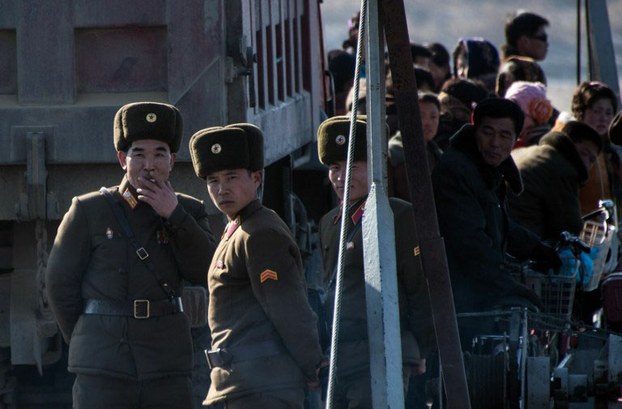North Korea sends active-duty soldiers to work in Kuwait, Qatar
| Publisher | Radio Free Asia |
| Publication Date | 13 June 2016 |
| Cite as | Radio Free Asia, North Korea sends active-duty soldiers to work in Kuwait, Qatar, 13 June 2016, available at: https://www.refworld.org/docid/579ef4b313.html [accessed 21 May 2023] |
| Disclaimer | This is not a UNHCR publication. UNHCR is not responsible for, nor does it necessarily endorse, its content. Any views expressed are solely those of the author or publisher and do not necessarily reflect those of UNHCR, the United Nations or its Member States. |
2016-06-13
 North Korean soldiers stand on a boat on the Yalu River near the border with China, Feb. 9, 2016. AFP
North Korean soldiers stand on a boat on the Yalu River near the border with China, Feb. 9, 2016. AFP
North Korea is sending growing numbers of active-duty soldiers to work at construction projects in the Middle East in an effort to bring hard currency in to the isolated, sanctions-hit state, a source in the Middle East says.
The number of civilian workers sent to Kuwait has dropped from about 4,000 last year to approximately 3,200 today, RFA's source said, speaking on condition of anonymity.
"But the number of North Korean soldiers deployed as laborers to construction sites in Kuwait and other Middle Eastern countries has rapidly increased," RFA's source said.
The soldiers, all in their 20s and belonging to engineering battalions in North Korea, are employed by the Middle East-based North Korean construction firms Namgang and Cholhyun, the source said.
"So far, the Namgang Company has dispatched about 800 North Korean [soldiers] as laborers to Kuwait and about 750 to Qatar," he said, adding that the Cholhyun company too has "steadily increased" the number of soldiers it has sent to work in Kuwait since its first deployment of 70 soldiers in 2010.
"Almost 30 percent of North Koreans now working in Kuwait are soldiers on active service," he said.
Disguised identity
North Korean authorities tell the soldiers sent to the Middle East to grow their hair long to disguise their identity, RFA's source said.
North Korea's growing use of soldiers as laborers sent abroad to work may be due to their readiness to quickly obey orders and to work without pay during their period of service overseas, he said.
The soldiers are "feisty and aggressive," though, and are resented by North Korean civilian workers for sometimes taking their jobs, he said.
"The ordinary laborers call the soldiers 'Makhno' – a Russian word meaning 'reckless gangsters' – and avoid all contact with them," he said.
More than 50,000 North Koreans have been sent abroad to work in China, Russia, Africa, and the Middle East, bringing in an estimated 1 billion pounds (U.S.$1,504,140,000) each year for the regime, according to U.N. special rapporteur on human rights in North Korea Marzuki Darusman, quoted in an Oct. 29, 2015 report by The Guardian.
In addition to seafood processing and factory work, many are employed in logging, textiles, and construction.
Reported by Albert Hong for RFA's Korean Service. Translated by Dohyun Gwon. Written in English by Richard Finney.
Link to original story on RFA website
